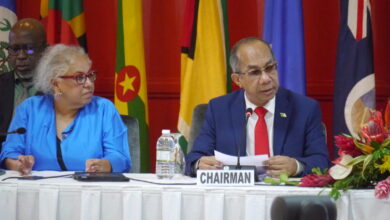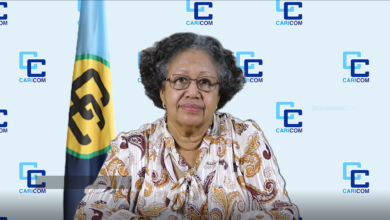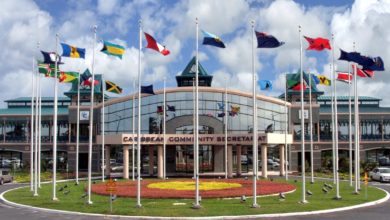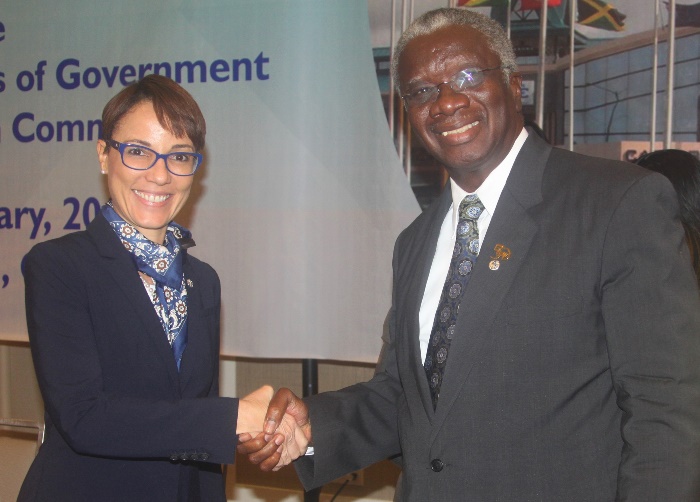Chair
Honourable Samuel Hinds, Prime Minister of the Republic of Guyana
Honourable Martin Joseph, Minister of National Security of Trinidad and Tobago and Chair of CONSLE
Honourable Ministers of Government of other Member states
Chair and Members of the Security Policy and Advisory Committee (SEPAC)
Executive Director and staff of the Implementation Agency for Crime and Security (IMPACS)
Staff Members of the CARICOM Secretariat
Representatives of the Media
Ladies and Gentlemen
I wish first of all to extend on behalf of the Secretary-General a very warm welcome to this the Seventh Meeting of The Council for National Security and Law Enforcement (CONSLE).
CONSLE was inaugurated in 2006. The holding of seven meetings in such a relatively short period of time is, I believe, unprecedented in the history of Council Meetings in the Community. This, no doubt, is indicative of the high importance being placed on addressing crime and security issues in our Region.
We are indeed deeply appreciative of the leadership of the Government of Trinidad and Tobago, whose Prime Minister holds the Crime and Security portfolio in the Quasi-cabinet, through Honourable Martin Joseph, Minister of National Security, as well as that of IMPACS in keeping us focused on the issues, especially those in the area of law enforcement. I understand that this is the first time CONSLE is being held in Guyana. We therefore wish to commend the government of Guyana, and particularly Minister Rohee and his staff, for the excellent arrangements that have been made to facilitate the work of the Council.
A 2007 report on Crime in the Caribbean, published by the World Bank and the United Nations Office on Drugs and Crime (UNODC), indicates that crime and violence are undermining growth, threatening human welfare, and impeding social development in the Caribbean and are therefore core development issues which demand an international response.
The report states that there had been an over-reliance on the criminal justice approach to crime reduction in the Region, to the detriment of other complementary approaches which can be effective in reducing certain types of crime and violence. It acknowledged, however, that several countries in the Region have been increasingly investing in various crime prevention approaches such as social crime prevention, prevention through environmental design or situational prevention, integrated citizen security approaches and public health approaches. Indeed, at the regional level the role played by CONSLE in guiding policy with regard to the law enforcement aspects of the crime and security agenda has been given the highest priority by Heads of Government.
Youth violence has been highlighted as a particularly serious problem in the Region. Situational analyses conducted under the aegis of the CARICOM Youth Commission (set up by the Conference of Heads of Government two years ago), point to the need to urgently address crime and violence among our youth and in our schools. As a result, a Special COHSOD Meeting in March this year mandated the CARICOM Secretariat to collaborate with international organisations and third states in developing a regional crime-prevention initiative to complement what is being done at the national and bilateral levels.
I am pleased to report that in pursuit of this mandate a joint CARICOM Secretariat-UNODC Expert Mission team recently held a series of fruitful consultations within and outside the CARICOM Secretariat, as well as with Guyana-based international organisations, donor agencies, diplomatic missions and government and Law Enforcement Officials.
These consultations spawned a successful exchange of views, strategic thinking and potential operational partnerships between UNODC and CARICOM in the prevention and fight against drugs and crime in the Region. We are currently collaborating in developing a draft multi-disciplinary crime prevention plan of action which will form the basis for wider consultations and a buy-in by stakeholders at the national and regional levels.
Given the multi-faceted nature of crime, it calls for a multi-sectoral approach. The development of this crime prevention initiative under the umbrella of COHSOD signals a first step in promoting cooperation among Councils. Just as we have had in the past to address policy issues in developing the Single Market and Economy in joint meetings of COHSOD and COTED, it would seem that the time has come for us to consider joint COHSOD-CONSLE Meetings to ensure joint action in moving the overall crime and security agenda forward.
As the World Bank-UNODC report points out, crime and violence are not immutable. While our countries face serious challenges, these are not insurmountable and informed policies at all levels – national, regional and international – can contribute to the reduction of crime and violence. The agenda of CONSLE will amply contribute to the policy governing law enforcement at both the national and regional levels.
In conclusion, I wish this Seventh CONSLE Meeting every success in its consultations.





